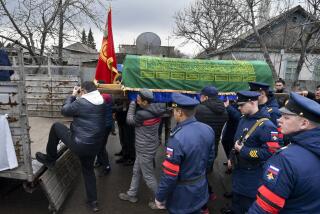Entrenched Discontent
- Share via
Ethnic violence in the Soviet republic of Uzbekistan in central Asia seems beyond Moscow’s comprehension, and that could mean there is worse to come.
The discontent that fueled waves of carnage, pillage and rape almost certainly results directly from long-term Soviet economic and social policies. That Moscow seems to think otherwise, thinking more in terms of conspiracies and opposition to perestroika , or economic restructuring, is a dangerous sign.
Uzbekistan is one of the most impoverished republics of the Soviet Union, combining a very poor standard of living with a very high rate of population growth. Central authorities in Moscow have essentially viewed the region as a colony--useful mostly for its raw materials, particularly cotton, but not an area to be developed beyond the plantation level. Unemployment is high and poverty severe. Partly because of the economic strains, organized crime and local corruption are rampant.
Economic discontent and national chauvinism combine to make Uzbeks deeply resentful of Russians and “outside” Muslim minorities, including the Meskhetian Turks, forcibly deported from Georgia to Uzbekistan in 1944 by Josef Stalin. In addition to being outsiders, the Meskhetians are Shiite Muslims while the Uzbeks are Sunni. But more importantly, experts say, the Uzbeks felt ambitious Meskhetians were taking away jobs, threatening black market “turf” and jacking up prices in the bazaar.
That the region’s economic frustrations vented along ethnic fissures is understandable. A dispute between an Uzbek and a Turk over the price of strawberries apparently escalated into random, uncontrollable group violence. In this the Uzbek unrest differs from clashes in Armenia last year and Georgia earlier this spring; the Armenians had a political goal--the return of the territory of Nagorno-Karabakh--and peaceful Georgian demonstrators were killed by panicky Soviet troops. Soviet authorities blamed “hooligans” and “anti- perestroika “ forces for the Uzbekistan violence, and one government official even discerned a fundamentalist pan-Islamic front whose goals include “revival of a medieval nationalist hysteria, discrimination and the expulsion of the republic’s European (that is, Russian) population.” On a four-day visit to the region, Prime Minister Nikolai Ryzhkov accused corrupt Communist Party officials of planning the riots.
Moscow is now paying the price for years of neglect of the region’s economic and cultural needs. Last week youth in the nearby republic of Kazakstan also went on a rampage against non-Kazaks, killing several and wounding 50. Their calls for an end to high-priced cooperatives and rationing reinforce the message that the root of this unrest is economic, not Islamic.
Of course there are no quick fixes for such entrenched discontent, but before a solution canbe found, Moscow has to come to terms with its past failure to understand and effectively govern the region. Ethnic tensions are historic and sporadic, the catalyst for uprising, not its energy. Simplifying the trouble into pro- and anti- perestroika forces or resorting to comforting conspiracy theories will only keep the ethnic pot boiling.
More to Read
Sign up for Essential California
The most important California stories and recommendations in your inbox every morning.
You may occasionally receive promotional content from the Los Angeles Times.












